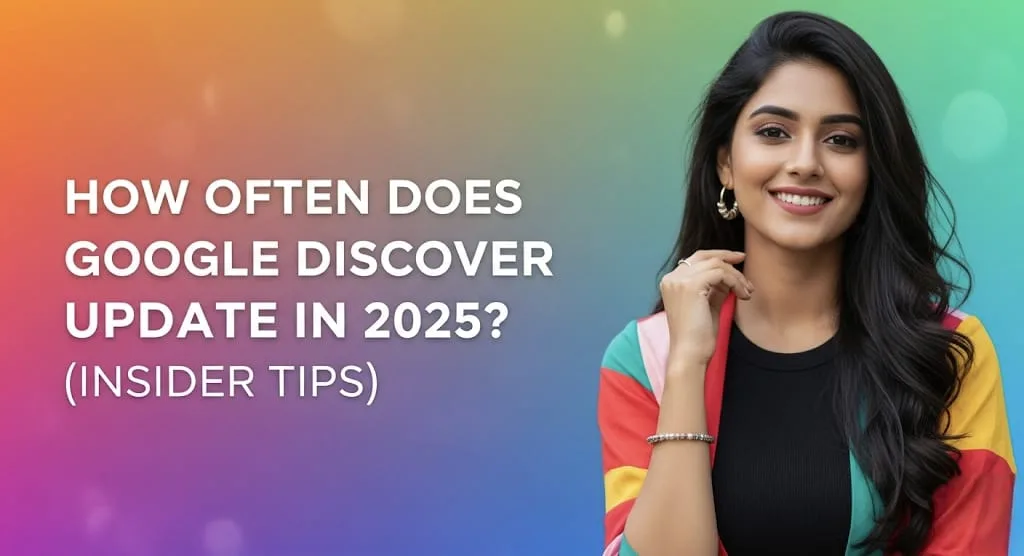Google Discover has become a pivotal source of traffic for many websites, serving up a highly personalised stream of content to users even when they aren’t actively searching. Unlike traditional search results, Discover is all about anticipating user interests and delivering relevant articles, videos, and news directly to their mobile devices. So, a burning question for content creators and publishers in 2025 is: How often does Google Discover update, and how can we keep up?
The short answer is, there’s no fixed schedule like a daily or weekly update. Google Discover is a dynamic and continuously evolving feed, driven by sophisticated AI and machine learning algorithms. It’s constantly analyzing user behavior, trending topics, and new content to serve up the most relevant information in real time. This means your content could appear in Discover at any moment, and its visibility can shift rapidly.
Understanding the Google Discover Algorithm in 2025
Think of Google Discover as a smart, ever-learning assistant. It doesn’t wait for you to type in a query; instead, it uses a deep understanding of your past interactions with Google services – like your search history, location data, app usage, and YouTube viewing habits – to predict what you might be interested in. In 2025, with advancements in AI, this personalization is even more granular.
The algorithm focuses on interest-based ranking, rather than keyword matching. This is a crucial distinction. It’s less about the exact words you use and more about the topics and entities your content covers, and how well those align with a user’s evolving interests. The system is always on, constantly recalculating visibility and relevance for each user session. This means what one person sees in their Discover feed might be completely different from what another sees, even seconds later.
The E-E-A-T Principle: Your Compass for Discover Success
In the ever-changing landscape of Google’s algorithms, the E-E-A-T principle remains paramount, especially for Google Discover. E-E-A-T stands for Experience, Expertise, Authoritativeness, and Trustworthiness. Google emphasizes these qualities more than ever in 2025 to ensure that users receive truly helpful and reliable content.
- Experience: This new “E” is vital. Google wants to see that the content creator has first-hand experience with the topic. If you’re reviewing a product, have you actually used it? If you’re giving advice, have you lived through the situation? Showcasing real-life insights and practical application through case studies or personal stories significantly boosts your content’s chances.
- Expertise: Demonstrate your subject-matter expertise. This means having authors with relevant qualifications, knowledge, and skills. Think detailed author bios, professional affiliations, and content that showcases a deep understanding of the topic, not just surface-level information.
- Authoritativeness: Build your brand’s authority in your niche. This comes from consistently publishing high-quality content that’s recognized and linked to by other respected sites and industry leaders. Mentions, press coverage, and a strong reputation within your field all contribute to authoritativeness.
- Trustworthiness: This is arguably the most critical component. Google wants to ensure your content is accurate, honest, and reliable. This involves transparent contact information, secure website protocols (HTTPS), clear privacy policies, accurate fact-checking, and responsive engagement with your audience. For Google Discover, sites that show strong trust signals are far more likely to appear.
Trending Topics in 2025 and Discover Optimization
While evergreen content can certainly appear in Discover, trending topics often receive a boost. In 2025, areas like Artificial Intelligence (AI) advancements, sustainable living, mental wellness, and immersive digital experiences (think AR/VR applications beyond gaming) are seeing significant interest. Geopolitical events and major technological breakthroughs also consistently trend.
To optimize for Google Discover, keep these tips in mind:
- High-Quality, Engaging Content: This is non-negotiable. Your content needs to be compelling, informative, and visually rich. Use high-resolution images (at least 1200px wide, enabled by
max-image-preview:large), and consider incorporating videos. - Mobile-First Design: Discover is primarily a mobile experience. Ensure your website is fast, responsive, and provides an excellent user experience on smartphones and tablets.
- Compelling, Honest Headlines: Your title is your content’s handshake in Discover. Craft clear, concise, and captivating headlines that accurately reflect the content. Avoid clickbait at all costs, as it can lead to manual actions against your site.
- E-E-A-T Signals: Actively work on demonstrating E-E-A-T. Feature author bios, cite reputable sources, and ensure all factual claims are backed by evidence. Transparency about your publication and authors is key.
- Timeliness and Freshness: While not exclusively for news, Discover does favor fresh, timely content. Regularly update your existing articles and produce new content around emerging trends relevant to your niche.
- User Engagement: Google values content that users find engaging. Monitor metrics like time on site and bounce rate in your Google Analytics. Content that keeps users engaged signals quality to Google.
Staying Ahead: Google’s Content Policies and Human-Centric Content
Google’s content policies for Discover are strict and are designed to ensure a positive and safe user experience. This means no misleading content, no sensationalism, and absolutely no harmful or dangerous material. Always prioritize authenticity and user value. Content that feels 100% human-written and original is crucial. Avoid any tactics that try to game the system, as Google’s algorithms are becoming increasingly adept at detecting such practices. The emphasis in 2025 is firmly on helpful, reliable, and people-first content.
In essence, while Google Discover doesn’t update on a fixed schedule, its constant evolution means publishers need to be equally dynamic. By focusing on E-E-A-T, embracing trending topics wisely, and adhering strictly to Google’s content policies, you stand the best chance of having your content discovered by the right audience at the right time.
Disclaimer: The information provided in this article is based on publicly available data, current industry understanding, and informed predictions for 2025 regarding Google Discover’s operational mechanisms and best practices. Google’s algorithms and policies are subject to change without prior notice.
